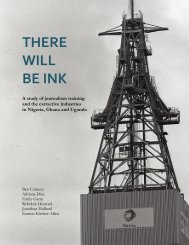Paper - Initiative for Policy Dialogue
Paper - Initiative for Policy Dialogue
Paper - Initiative for Policy Dialogue
Create successful ePaper yourself
Turn your PDF publications into a flip-book with our unique Google optimized e-Paper software.
12<br />
Adding Brazil and Botswana enhances, of course, the importance of the perspective<br />
advanced in this book, the developmentalist state, one which takes an active role in<br />
promoting development. In both of these countries, governments played a central role in<br />
promoting growth. Brazil adds one important wrinkle: it pursued what was essentially<br />
an import substitution policy as opposed to export led growth (though it did not neglect<br />
exports) during the period of rapid growth that the GSC focuses on. (There is one other<br />
way in which Brazil changes the picture presented in the East Asia Miracle. That book<br />
emphasized the importance of education and equality. Brazil through most of this period<br />
per<strong>for</strong>med relatively poorly on both counts; more recently, it has per<strong>for</strong>med better on<br />
both). What is essential is “learning,” and an appropriately designed import substitution<br />
policy can be the basis of technological advances and export diversification, as Brazil has<br />
repeatedly shown. (The Spence Commission seems to implicitly disagree with the<br />
Washington Consensus view of the lost decade—it was the inevitable result of flawed<br />
import substitution policies. As Stiglitz 15 , Rodrik 16 and Ocampo 17 have argued<br />
elsewhere, it was mainly the result of the macro-economic disturbance brought to Latin<br />
America by America’s monetary policies, sometimes referred to as the “Volcker<br />
shock 18 ”.<br />
Botswana brings to the <strong>for</strong>e another lesson, of especial importance to Africa:<br />
natural resources do not have to be a curse. If appropriately managed, they can be a<br />
blessing. But the fact that there are so few natural resource countries on the list of<br />
success cases is a reminder how difficult that is. 19<br />
What is notable in the list of policies leading to sustained growth are some things<br />
that are not there. The “expanded” Washington Consensus policies (expanded beyond<br />
the list of prescriptions <strong>for</strong>mulated <strong>for</strong> Latin America, in Williamson’s original paper<br />
defining the Washington consensus 20 ) did not include capital and financial market<br />
liberalization—something that most of the success cases treated with caution; and it did<br />
not include clear systems of property rights—how could it, when among the most<br />
successful cases was China, where they are just now becoming more precisely defined.<br />
Indeed, contrary to the “property rights school,” several of the success cases began with<br />
large land re<strong>for</strong>ms. But while property rights may not play the pivotal role that Hernando<br />
DeSoto has suggested, deficiencies in property rights system can be a hindrance to<br />
growth, and that may be the case in some African countries.<br />
countries in emulating East Asian style interventions (they were deemed to be particularly daunting <strong>for</strong><br />
Africa) and to downplay the role of some interventions, e.g. it argues that industrial policy did not make<br />
much of a difference in East Asia.<br />
15 Joseph Stiglitz (2006), Making Gobalization Work, W.W. Norton & Co, p.36.<br />
16 Dani Rodrik (1999), The New Global Economy and Developing Countries: Making Openness Work,<br />
Overseas Development Council, p.75.<br />
17 Ocampo’s many relevant writings include: Enrique Cárdenas, José Antonio Ocampo, and Rosemary<br />
Thorp (editors) (2000), An Economic History of Twentieth-century Latin America: Industrialization and the<br />
State in Latin America: The postwar years, Palgrave.<br />
18 This refers to Paul Volcker’s role as Chairman of the US Federal Reserve Bank, in the sharp rise in<br />
interest rates in the US in the later part of the 1970s to fight inflation.<br />
19 See McCartan, Sachs, and Stiglitz, The Resource Curse, <strong>for</strong> a more extensive discussion of these issues.<br />
20 Williamson, John (1989) “What Washington Means by <strong>Policy</strong> Re<strong>for</strong>m”, in: Williamson, John (ed.): Latin<br />
American Readjustment: How Much has Happened, Washington: Institute <strong>for</strong> International Economics.














